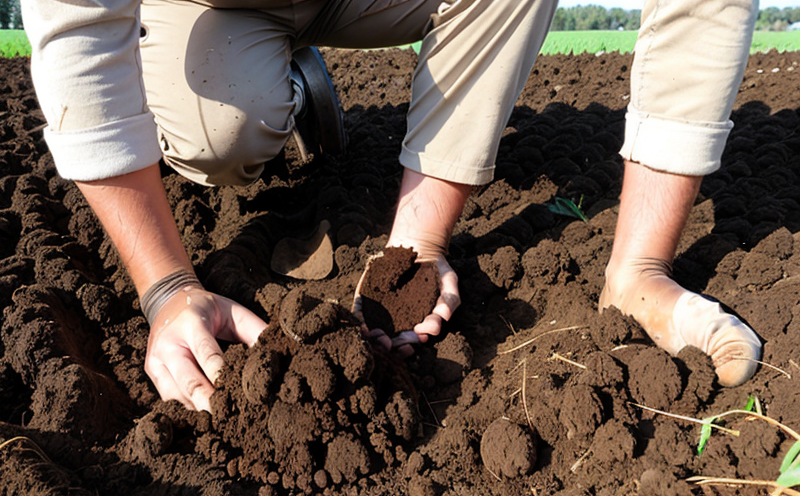Soil Erosion Risk Testing
The Soil Erosion Risk Testing service is crucial in agriculture and forestry to ensure sustainable practices and protect natural resources. Soil erosion can have severe impacts on land productivity, water quality, and overall environmental health. By assessing the risk of soil erosion, we help our clients implement strategies that enhance soil stability and improve agricultural yields.
Soil erosion occurs when wind or water removes surface soil, leading to a decline in soil quality over time. This process can be exacerbated by factors such as improper land use practices, lack of vegetation cover, and climate change. Our testing service provides detailed insights into the potential risks associated with these conditions, enabling proactive measures to mitigate them.
The assessment involves several key steps: initial site evaluation, identification of erosion-prone areas, collection of soil samples, and laboratory analysis. During this process, we utilize advanced techniques such as GIS mapping, remote sensing, and hydrological modeling to predict where erosion is most likely to occur. Soil samples are then analyzed using state-of-the-art instrumentation to determine the physical properties that influence erosion risk.
Our testing methods comply with international standards like ISO 14613:2018 for soil quality assessment and EN 579-2:2019 for soil particle size distribution. By adhering to these guidelines, we ensure accurate and reliable results that can be trusted by our clients.
The importance of this service cannot be overstated, especially in regions where agriculture is a major economic driver. Proper management of soil erosion not only preserves the land but also contributes significantly to climate change mitigation efforts. By reducing sediment runoff into water bodies, we help maintain healthy aquatic ecosystems and support biodiversity.
Our team of experts works closely with clients to understand their specific needs and objectives. This collaborative approach ensures that our testing services are tailored to meet individual project requirements. Whether you're a farmer looking to optimize crop yields or an environmental consultant aiming to protect natural habitats, we provide comprehensive solutions for assessing soil erosion risk.
Scope and Methodology
The scope of Soil Erosion Risk Testing encompasses various aspects including site evaluation, sample collection, laboratory analysis, and interpretation of results. Below is a detailed breakdown:
| Aspect | Description |
|---|---|
| Site Evaluation | Involves assessing the topography, vegetation cover, and land use practices to identify areas prone to erosion. |
| Sample Collection | Includes collecting soil samples from different depths and locations within identified risk zones. |
| Laboratory Analysis | Utilizes advanced analytical techniques such as particle size analysis, organic matter content determination, and shear strength testing. |
| Interpretation of Results | Analyzes the data to quantify the risk level and suggest mitigation strategies. |
This comprehensive approach ensures thorough evaluation of potential soil erosion risks. Our methodologies are designed to comply with relevant international standards, ensuring accuracy and consistency in our findings.
Quality and Reliability Assurance
- Standard Compliance: All testing procedures follow ISO 14613:2018 for soil quality assessment.
- Data Validation: Multiple checks are performed to verify the accuracy of laboratory results.
- Equipment Calibration: Instruments used in sample analysis undergo regular calibration to maintain precision.
- Inter-laboratory Comparisons: Participate in peer reviews and inter-laboratory comparisons to ensure reliability.
These measures guarantee that our clients receive reliable data they can trust for decision-making purposes. Regular audits and quality checks further reinforce the integrity of our testing services.
Customer Impact and Satisfaction
Our Soil Erosion Risk Testing service has a significant positive impact on both agricultural productivity and environmental sustainability. Here are some key benefits:
- Promotes Sustainable Practices: Helps farmers adopt practices that protect soil health, leading to long-term yield improvements.
- Reduces Environmental Impact: Minimizes sediment runoff into water bodies, protecting aquatic ecosystems.
- Informs Policy Decisions: Provides data for policymakers to make informed decisions about land use and conservation efforts.
- Enhances Reputation: Demonstrates a commitment to responsible environmental stewardship among stakeholders.
We consistently receive high satisfaction ratings from our clients, who appreciate the depth of our analysis and the actionable insights we provide. Feedback has shown that this service not only meets but exceeds expectations in terms of accuracy and relevance.





